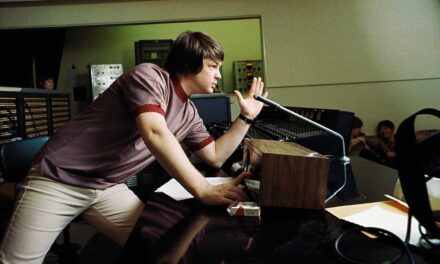‘It is a truth universally acknowledged, that a single man in possession of a good fortune, must be in want of a wife.’ (Austen, 1813: 1).
As has no doubt become clear across this series of blogs, Succession has a lot of things happening simultaneously. The series crosses multiple genres including satire, high drama and pseudo-period drama, all of which (along with HBO as legitimator, McCabe and Akass, 2018) contribute to its positioning as quality television (Weissmann, 2012). Yet one of the key generic elements of the series is romantic comedy, particularly regarding the relationship between Tom (Matthew Macfadyen) and his cousin-by-marriage, Greg (Nicholas Braun). Succession engages with romantic comedy upon multiple levels, including, I would argue, leveraging the intertextual casting reference to Pride & Prejudice (2005, dir. Wright; hereafter P&P) in which Macfadyen plays the awkward romantic lead par excellence, Mr Darcy. While the series is not explicitly parodying Austen, it does engage with (or, arguably, appropriate the cultural capital of cf Weissmann, 2012) many of the tropes associated with her novels just as much as it engages with romantic comedy film/TV tropes and casting functions intertextually (Gray, 2010). Grindon (2011: 21-22) states that
Romantic comedy features the risks, vulnerability, and hesitation typical of flirtation in order to rise toward the intensity of a couple’s union. […] The self-sacrifice of love transforms the awkwardness of courtship into grace. The return to socially acceptable behavior arises with the publicly acknowledged union of the lovers, typically marriage.
I have already discussed self-sacrifice, but it does connect strongly to love as well as martyrdom and in 4.6 Tom discursively links the acquisition of wealth and status to the acquisition of a relationship, believing that love would not be enough to entice someone to be in a lasting relationship with him. While that can be read as Tom referring to himself specifically in that regard – and, though he is speaking with his estranged wife and Roy-al daughter Shiv (Sarah Snook), whose protection he is attempting to acquire, this can also be read as Tom referring to Greg – it also connects to the set of difficulties often ensuring that the path of true love never runs smooth in romantic comedies.
The series analogises the Roy family corporate empire asa pseudo-royal court, meaning that this central romance can be read in terms of self-sacrificial, chivalrous, chaste, socially-disparate ‘courtly love’ which features a disconnect between public derision and private encouragement of a provincial noble knight’s love for a member of the royal family (Coulthard, 2010). But because the central romance here is queer and takes place in a homophobic environment a public/private disparity is also evident in the ways in which both characters negotiate their identities in that hostile environment. In 4.1, as a way of illustrating that Tom and Greg have developed a close, relatively power-balanced social relationship, Greg touches Tom very low on his back in a way which can be read as intimate, bordering on sexual, even though they are not in a romantic or physical relationship at the time. Tom tells him ‘not here,’ as they are at patriarch/CEO Logan’s (Brian Cox) birthday party and, as such, in public (and on security camera). Because of the fact that they are often in the public eye, both characters tend to communicate emotion through gesture and, when alone, touch. These also allow for such romantic tropes as longing and/or loving looks across a room,[1] particularly dance floors (1.10, 4.5); both silence and an inability to communicate are also staples of characterisation in romance texts (Page, 1972; Tuite, 2019). In this case, it is also Lord Alfred Douglas’ ‘love that dare not speak its name’ (The Two Loves, 1892) for fear of losing access to heteronormative, homophobic spaces of power that are perceived to be necessary to sustain or retain that love. The toxic masculinity associated with the ultrarich is yet another obstacle placed in the way of the would-be couple though, as Austen’s line quoted above points out, the need for financial security in addition to love for a successful relationship is nothing new.
The scene I have discussed extensively in the first blog in which Tom forgives and retains Greg after the latter betrays the former features a polysemic example of the negotiations between the Neronic and Christlike aspects of the character with regard this romance. Earlier in 4.10, Logan’s eldest son Connor (Alan Ruck) gives the various characters stickers with which they can indicate interest in one of Logan’s possessions which Connor was ‘reallocating.’ Tom is not seen indicating interest in any of what Connor terms ‘prized items’ items during that sequence, but after Tom tells Greg (in the public setting of Roy family corporate empire Waystar’s offices, though a private conversation) that he is keeping him, Tom places one of the stickers on Greg’s forehead, giving him a direct look of both merriment and flirtatiousness which Greg and the audience can see but those around them in the scene presumably cannot.[2] That the sticker comes from what is essentially an auction and the earlier reference in 4.10 to Greg having to take a pay cut to a salary more typical of his position being described as ‘castration’ connects this strongly back to the idea of Nero and Sporus, particularly the idea that Greg/Sporus would replace Shiv/the Augusta. In series two, when Shiv briefly became Logan’s choice of successor, she was to be given a position which would give her experience with a number of different areas within the company in order to train her for the CEO position as she had previously worked in politics rather than business. The only non-homophobic reason for Tom and Greg to not engage in a consensual romantic or sexual relationship is that Greg reports directly to Tom during the majority of the series. Arranging for Greg to have similar training to what had been planned for Shiv would officially take Greg out from under Tom occupationally would then allow Greg to be under Tom recreationally. This also would fit the analogy to the Holy Roman Empire discussed in the previous blog.
The use of the sticker also illustrates that, not only was Greg seen as Logan’s (unwanted) possession,[3] but also that Tom has long since recognised the uncertainty of Greg’s loyalties and believes that, now that he is CEO and can provide money, status and protection as well as love, Greg can or will now be loyal to him. That Tom places the sticker directly over the spot on Greg’s forehead where he kissed him in 3.7 in joy at being spared gaol reinforces the analogy.[4] Touch, explicit kindness and other expressions of emotion are only (diegetically) allowed in private whereas, in public, toxic/hegemonic masculinity must be performed. This makes the use of the bid sticker a publicly-coded expression of possession (associated with Nero but subverted by love) which hides a private expression of love (associated with Jesus but subverted by queerness) that only Tom, Greg and the audience can recognise. In addition, it functions as the endpoint embrace Grindon (2011: 23) notes as key to the romantic comedy, albeit not quite the publicly acknowledged marriage Grindon (2011: 22) considers to be typical. It does this by referencing one of the most memorable instances where Tom shows vulnerability – another of Grindon’s (2011: 22) keys to romantic comedy – the castration metaphor and Nero/Sporus analogy by which Tom expresses his love and attraction for Greg in 3.4 during an emotional breakdown (Grindon, 2011: 22).
Additionally, the idea of anointing a follower with oil or ash as an identification is common to multiple Christian denominations, so as well as being a sign of love, this marked identity (which Roberts, 2011, calls a negative with regard to a visible queer identity) though potentially (and diegetically-publicly) read as possession can be read more positively as Tom ‘claiming’ Greg as a disciple and/or as a sign of Tom’s protection.[5] In the first blog I noted that Greg (and Shiv) can be read as Judas analogues but, because of the conflation between the two characters inherent in the ‘replacement’ metaphor, both can also be read as the archetypal penitent Mary Magdalene. Both were disciples but this analogy is also relevant to the discussion of masculinities in the context that Mary Magdalene is sometimes interpreted as Jesus’ wife. The garbled version of the Nero and Sporus story that Tom gives in 3.4 has Nero ‘replacing’ the wife that the emperor had ‘kicked down the stairs’ with the castrated Sporus. In addition to the ‘replacement,’ the ‘down the stairs’ aspect can be reinterpreted either as Shiv moving into the downstairs bedroom while Tom takes the upstairs one and/or more generally as a demotion of her status after she chose to sell the company in order to prevent her brother Kendall (Jeremy Strong) from having control over it and its power. Both Greg and Shiv are clearly penitent, as both characters are shown agonising over their choices, and both are forgiven and kept in the ‘flock,’ (grex/gregis, Luke 12:32) though Shiv’s presence seems a requirement based on Waystar’s new owner Matsson’s (Alexander Skarsgård) interest in her (for/from which Tom can be both facilitator and/or protector) as well as legitimacy of Tom’s CEO-ship through her and their unborn child. By contras,t the connection Tom makes in 3.4 between castration, marriage and love reinforces that keeping Greg in 4.10, in the manner described above, is an act of love. The ultimate end of the series does, however, present a subversion of the already-ironic, certainly-iconic first line of P&P – Tom is now in possession of a good fortune[6] but is neither single nor in want of a wife; rather, he and Shiv are together out of necessity and Tom’s love and desire are for Greg.
The multiplicity of potential readings and outcomes for the characters after the series ends helps create the complexity and ambiguity that befits a ‘quality drama’ as well as a longstanding engagement for the audience, encouraging forensic fandom through rewatching (and, to do so, buying DVDs or maintaining streaming subscriptions). More than that, however, through its multiplicity of genres associated with ‘quality,’ Succession helps to elevate the cultural capital of not just romantic comedy but specifically queer romance. Aligning a queer romance with what St Thomas Aquinas terms the highest theological virtue, caritas (‘love related to the soul or heart’),[7] in the context of Tom being connected to two divinely associated entities but who is seemingly destined to be sacrificed for the sins of his new boss Matsson, all within a pseudo-royal court, reinforces the damage done by toxic/hegemonic masculinity as well as the challenge(s) that queer masculinities can offer and suffer within the contemporary corporate and ultrarich environments. Love itself can be read as salvation for Greg (at least with regard to his career), but possibly for Tom as well, particularly if Greg responds to Tom’s forgiveness and love (and the attendant status and security that brings) with greater loyalty and a stronger relationship in all senses. As the series ends after a privately acknowledged but publicly made union between them, we can but hope.
Dr Melissa Beattie is a recovering Classicist who was awarded a PhD in Theatre, Film and TV Studies from Aberystwyth University where she studied Torchwood and national identity through fan/audience research as well as textual analysis. She has published and presented several papers relating to transnational television, audience research and/or national identity. She is currently an adjunct with Southern New Hampshire University and, as of August, will join the liberal arts faculty of Al Akhawayn University, Ifrane, Morocco as an assistant professor. She is under contract with Lexington for an academic book on fictitious countries and Palgrave for a book on Canadian crime dramas. She has previously worked at universities in the US, Korea, Pakistan, Armenia, Ethiopia and for a brief time in Cambodia. She can be contacted at tritogeneia@aol.com.
Footnotes
[1] When speaking at Logan’s funeral in 4.9, his elder brother Ewan (James Cromwell) told the audience how, as very young children being evacuated to Canada from Scotland during WWII, Ewan and Logan had been forced to hide in total silence in the hold of a ship for days. Because of the fear that Nazi U-boats would find the ship if they made any noise, young Ewan and Logan had to communicate with only their eyes. Given how homophobic the ultrarich corporate environment is, one can read Tom and Greg communicating silently to be a parallel.
[2] Remembering that one synonym for ‘happy’ is ‘gay’ can reinforce this argument.
[3] Earlier in series four assistants were described as ‘recording devices’ for others in the company, strongly implying that Greg’s initial assignment as Tom’s assistant was an attempt by Logan to have Greg spy on Tom. Greg was assigned to a similar role with Kendall in 2.10. In both instances Greg was an ineffective spy as his loyalties could be swayed by money and/or status from Kendall, which may in part explain Logan’s dislike of Greg.
[4] The kiss can retrospectively be read as a Judas kiss as well as a romantic gesture, prefiguring that Tom will forgive and save his beloved betrayer.
[5] In addition to Matsson’s (justifiable) anger at Greg for his betrayal in 4.10, as discussed in the earlier blogs, Matsson engages in similarly homophobic ‘games’ as Logan did. This implies Greg would need protection from Matsson’s excesses.
[6] Recall that the meaning of the name of the first HRE Emperor Otto is ‘possessor of wealth.’
[7] ‘Fides spes caritas maior autem his est caritas’ (Aquinas, Commentary on 1 Corinthians). ‘Faith/loyalty, hope/expectation [and] love relating to the heart or soul [charity]; the greatest/best of these is caritas.’ Aquinas was commenting upon one of Paul’s many letters.
References
Coulthard L (2010) Desublimating Desire: Courtly Love and Catherine Breillat, Journal for Cultural Research, 14(1): 57-69.
Gray J (2010) Show Sold Separately: Promos, Spoilers, and Other Media Paratexts. NY: NYU Press.
Grindon L (2011) The Hollywood Romantic Comedy: Conventions, History, Controversies. Malden, MA: Wiley-Blackwell.
McCabe J and Akass K (2018) HBO and the Aristocracy of Contemporary TV Culture: Affiliations and Legitimatising Television Culture, Post-2007. Mise au point [online]. https://journals.openedition.org/map/2472. Accessed 11/5/24.
Page N (1972) The Language of Jane Austen. London: Routledge.
Tuite C (2019) Speechless: Werther-Fever and the Media of Romantic Love Cultural and Social History, 1-21.
Weissmann E (2012) Transnational Television Drama: Special Relations and Mutual Influence Between the US and UK. Houndmills: Palgrave MacMillan.





